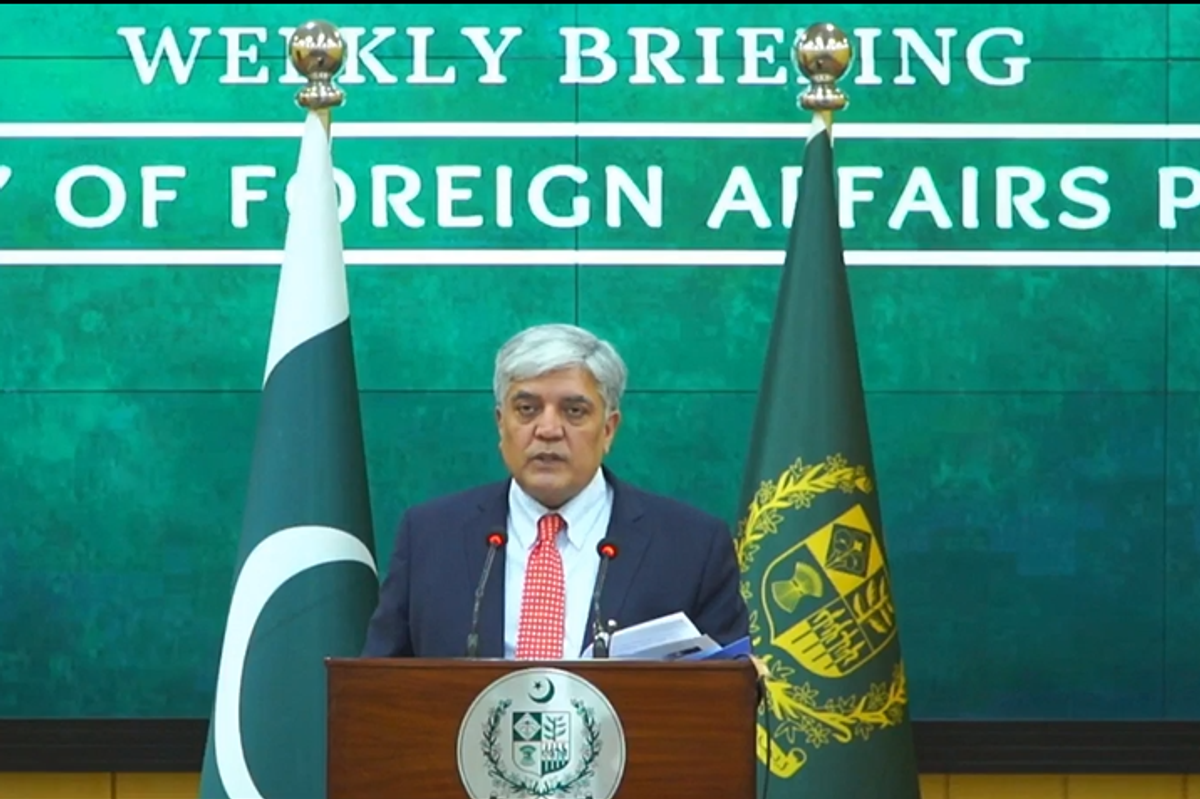Pakistan says no mediation offer received amid escalating tensions with India
Foreign Office firmly denies that any Pakistani individual has been named, arrested, or connected to the Pahalgam attack

Aamir Abbasi
Editor, Islamabad
Aamir; a journalist with 15 years of experience, working in Newspaper, TV and Digital Media. Worked in Field, covered Big Legal Constitutional and Political Events in Pakistan since 2009 with Pakistan’s Top Media Organizations. Graduate of Quaid I Azam University Islamabad.

A screengrab from a video of the Ministry of Foreign Affairs Spokesperson Shafqat Ali Khan's weekly press briefing at Pakistan's Ministry of Foreign Affairs, on April 18, 2025.
Ministry of Foreign Affairs/Facebook
Pakistan said on Friday that no country has offered to mediate in the latest escalation with India, but noted it would respond appropriately if such an offer is made.
Foreign Office Spokesperson Shafqat Ali Khan made the remarks during his weekly press briefing in Islamabad, addressing heightened tensions following a deadly attack on tourists in Pahalgam, located in Indian-administered Kashmir. India has blamed Pakistan for the attack an allegation Islamabad strongly denies.
In the aftermath, India announced on Wednesday a temporary suspension of the Indus Waters Treaty, a key bilateral water-sharing agreement, and gave Pakistani nationals 48 hours to leave the country.
In response, Pakistan unveiled a series of retaliatory measures. These include shutting down the Wagah border crossing, declaring any Indian attempt to block water flow as an act of war, and suspending all trade ties with India.
Visas issued to Indian citizens under the SAARC scheme have also been cancelled, except for Sikh pilgrims. Moreover, Pakistan has declared Indian naval, air, and defense advisers persona non grata and ordered them to leave by April 30. The Indian High Commission in Islamabad has been asked to reduce its staff to 30. Pakistan has also closed its airspace to Indian carriers.
“Pakistan’s position on the Indus Waters Treaty is consistent and unambiguous. It is not just a legal commitment -- it is a matter of life and death,” the foreign office spokesperson said, adding that Pakistan rejects India’s diplomatic note and will continue to engage the international community on the issue.
The FO described the water treaty as a "lifeline" for over 250 million people, confirming that river flows remain normal and India has not blocked or diverted any water so far.
‘No Pakistani named or linked to Pahalgam attack’
Addressing recent allegations by Indian authorities, the FO strongly denied any Pakistani involvement in the deadly attack in Pahalgam, Kashmir. “There is no Pakistani individual named, arrested, or connected to the incident,” the spokesperson stated.
However, police in Indian-administered Kashmir on Thursday released notices identifying three suspected militants allegedly involved in the attack and offered rewards for information leading to their arrest. Authorities claimed that two of the suspects are Pakistani nationals, though they did not specify how the identities were confirmed.
FO spokesperson criticized India’s response, saying, “Despite deploying over 800,000 troops in occupied Kashmir, the attack occurred. Instead of introspection, India has chosen to hastily and irresponsibly blame Pakistan without any credible evidence.”
He further slammed Indian media for promoting what he called “baseless accusations” against Pakistan without reliable intelligence. “This is an extremely unfortunate and irresponsible approach,” he said.
The spokesperson added that such unsubstantiated claims only serve to heighten regional tensions. “India’s behavior has made bilateral engagement, including trade, increasingly difficult,” he said.
Reaffirming Pakistan’s commitment to international norms, Khan emphasized that the country continues to uphold its global obligations. “Unlike India, which acts unilaterally and threatens regional stability, Pakistan remains firmly committed to agreements such as the Indus Waters Treaty,” he said.
Pakistan briefs diplomats
As part of its ongoing diplomatic outreach, Pakistan’s Foreign Secretary Amna Baloch briefed Islamabad-based heads of missions and diplomats on the latest developments following the Pahalgam attack in Kashmir.
She shared key points from the National Security Committee meeting, rejecting India’s baseless accusations against Pakistan.
The foreign secretary warned that India’s politicization of terrorism undermines regional peace and security, and cautioned against any escalatory actions, reaffirming Pakistan’s commitment to respond decisively to any aggression.
Kashmir conflict
Kashmir, a Muslim-majority Himalayan region, is divided between India and Pakistan and claimed in full by both. A portion is also administered by China.
The two South Asian neighbors have fought three wars since their partition in 1947 -- in 1948, 1965, and 1971 -- two of them over Kashmir.
In northern Kashmir’s Siachen glacier, Indian and Pakistani forces have also engaged in sporadic conflict since 1984, with a ceasefire in place since 2003.










Comments
See what people are discussing